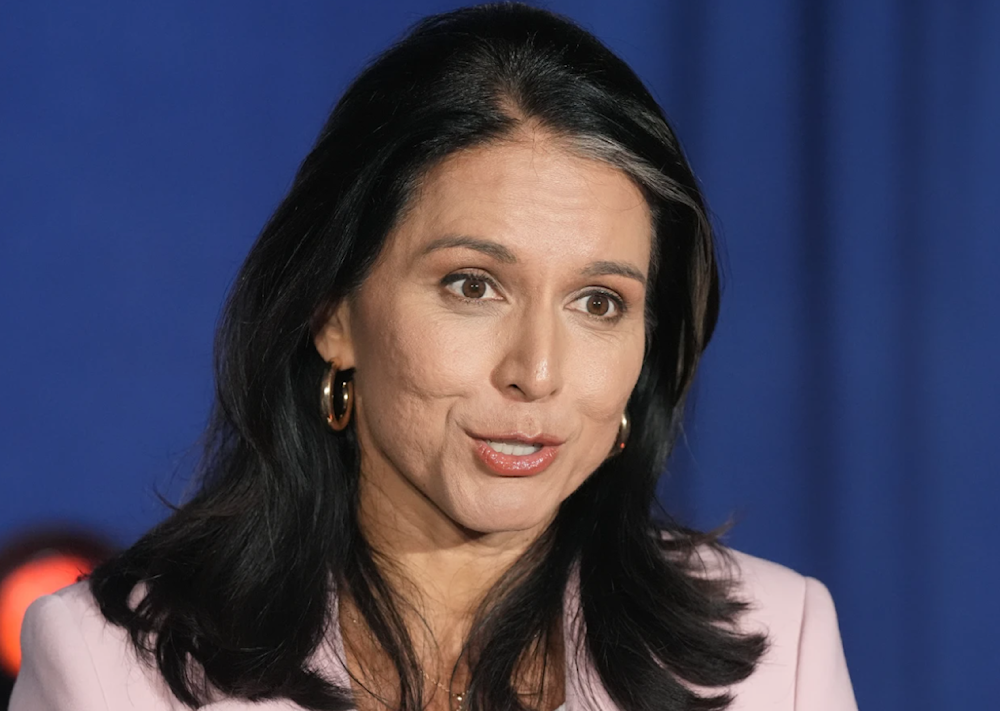Ignoring intel: How US lawmakers are distorting Iran’s nuclear reality
On March 25, Tulsi Gabbard testified before the Senate Intelligence Committee that Iran was not pursuing nuclear weapons, citing the intelligence community’s continued assessment.
-

Former Democratic Representative Tulsi Gabbard answers a question during a campaign event on September 14, 2024 (AP)
Despite clear US intelligence assessments stating that Iran is not building a nuclear weapon, many American lawmakers, both Republican and Democrat, are ignoring that conclusion and publicly pushing a narrative that suggests the opposite, Branco Marcetic writes in Responsible Statecraft.
A sharp divide has opened between US President Donald Trump and the US intelligence community over Iran’s nuclear progress, as Trump asserts that Tehran is just "weeks away" from acquiring a nuclear weapon, a claim not supported by current US assessments and that falls in line with the Israeli rhetoric.
On March 25, Director of National Intelligence (DNI) Tulsi Gabbard testified before the Senate Intelligence Committee that Iran was not pursuing nuclear weapons, citing the intelligence community’s continued assessment.
“The IC continues to assess that Iran is not building a nuclear weapon and Iranian leader Sayyed Ali Khamenei has not authorized the nuclear weapons program that he suspended in 2003."
The top Democrat on the Senate Intelligence Committee, Sen. Mark Warner, confirmed this position again on Wednesday, stating that he received an updated briefing reaffirming that conclusion this week.
“So far, at least, the intelligence community has stood by its conclusion that Iran is not moving toward a nuclear weapon,” Warner told reporters. “If that has changed, we need to see the facts.”
This conclusion, consistently upheld by US intelligence since 2007, was delivered as part of the Annual Threat Assessment.
Senators disregard intelligence, fuel nuclear narrative
Yet most senators, including those who heard Gabbard's testimony firsthand, have gone on to make public statements implying that Iran is rapidly developing nuclear arms, statements that directly contradict the intelligence community's findings.
Senators like Tom Cotton, Todd Young, and others have made repeated claims that Iran is rushing toward a nuclear weapon or already has a program underway. Cotton, in particular, misrepresented Defense Secretary Pete Hegseth’s remarks and has used Gabbard’s absence from a later meeting, where she was allegedly on National Guard duty, to dismiss her testimony entirely.
On the Democratic side, figures like Sens. Mark Kelly, Ron Wyden, Michael Bennet, and Kirsten Gillibrand have echoed similar alarmist rhetoric, justifying "Israel’s" ongoing war on Iran as a necessary step to prevent nuclear proliferation, even as intelligence reports deny that such a program exists.
A few senators have remained silent or more cautious. Sen. Jack Reed, for instance, criticized "Israel’s" escalation and warned that it might push Iran toward nuclear weapon development, despite current intelligence showing no such pursuit.
Meanwhile, as the Trump administration considers joining "Israel’s" war, multiple sources, including CNN and The Wall Street Journal, report that US intelligence agencies still find no evidence Iran is pursuing a bomb. Officials have also reportedly rejected Israeli intelligence that claims otherwise.
Marcetic believes that ultimately, Washington appears to be on the brink of war with Iran, driven not by verified intelligence but by political rhetoric that contradicts the facts, raising concerns that US leaders are deliberately sidelining their own intelligence community in favor of a narrative that justifies military action.

 3 Min Read
3 Min Read










